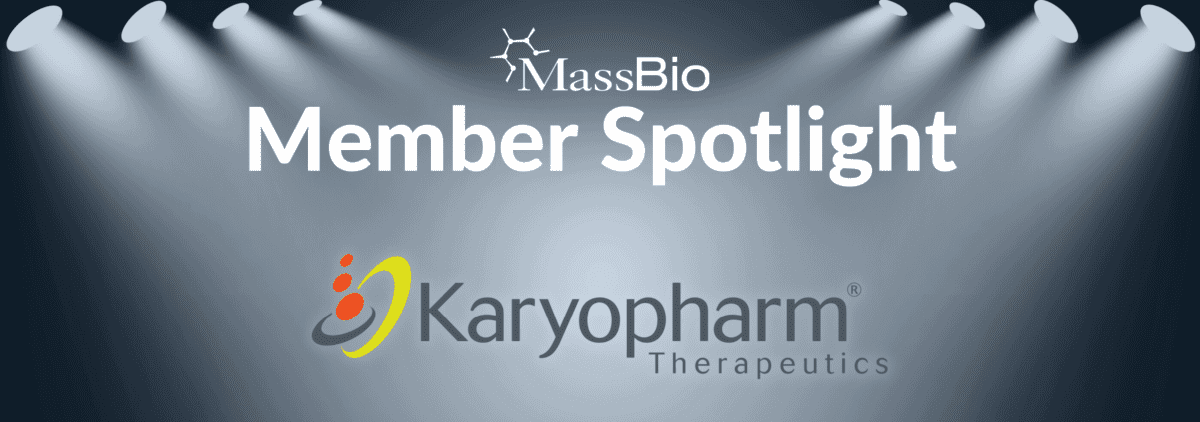
Every month, MassBio spotlights a member company and the great work they’re doing to advance the life sciences industry and support the patients we serve. In June, we spoke with Richard Paulson, President and CEO of Karyopharm Therapeutics, who has been leading the organization since May 2021. He’s served as a member of Karyopharm’s Board of Directors since February 2020, and was previously an Executive Vice President of Ipsen Pharmaceuticals, Inc. and Chief Executive Officer of Ipsen North America from February 2018 to May 2021.
Tell us about your organization, its mission, and current initiatives.

Karyopharm Therapeutics is a commercial-stage pharmaceutical company pioneering novel cancer therapies. Everything we do is driven by our mission to positively impact patient lives and defeat cancer. Our foundation is in our science, and we are the global leader in the inhibition of nuclear export. Against this backdrop, we believe we have a strong organization comprised of diverse and passionate individuals, which allows us to execute our mission every day. Our key pillars drive our underlying value and provide opportunity for what we believe will be substantial future growth. We are successfully building upon our existing multiple myeloma franchise, and together with our global commercialization partners, we are increasingly bringing XPOVIO® (selinexor) to patients worldwide. Additionally, we are aiming to make strong progress in advancing a clinical pipeline comprised of mid and late-stage clinical development programs. Our pipeline is purposefully built and strategically focused on targeting cancers with high unmet need where our science enables us to make the biggest difference in the lives of patients. To that end, we are pursuing approval opportunities in four core programs including multiple myeloma, endometrial cancer, myelofibrosis, and myelodysplastic syndromes over the next two to four years.
How do your organization’s activities help patients now and into the future?
At Karyopharm, patients are at the core of everything we do. They inspire us, keep us motivated, and are critical in our pursuit of developing important new medicines to defeat cancer. We strive to be equally relentless in our pursuit of innovative therapies that aim to improve a patient’s cancer journey and impact the trajectory of their disease. We leverage inhibition of nuclear export as a mechanism to treat cancer and prioritize our core programs by focusing on areas of high unmet need. Karyopharm also partners with several ex-US companies with the common goal of expanding the number of patients who can access our drugs in important global territories. Lastly, Karyopharm implemented an Expanded Access Program in 2013 which provides selinexor free of charge to patients who are suffering from severely debilitating or life-threatening diseases which cannot be treated satisfactorily by an authorized drug in their country. To date more than 800 patients have been treated through Karyopharm’s Expanded Access Program (KEAP).
What do you see as the biggest challenge facing the life sciences industry today?
One of the most complex challenges that the life sciences industry faces today is lack of diversity in clinical research. Participants in clinical trials should represent the patients that will use our medications in the real world. However, people from racial and ethnic minorities and other diverse groups are severely underrepresented in clinical research. Ensuring individuals from diverse backgrounds are enrolled in clinical trials is key to advancing health equity. Serious improvements will require conversations and understanding from all sides. At Karyopharm we are committed to diversity, equity, inclusion and belonging. We encourage enrollment of individuals from diverse backgrounds onto our clinical trials and select clinical trial sites in areas with more diversity.
What’s next for your organization / what are you focused on in the coming year?
In multiple myeloma, we are very focused on leveraging our commercial capabilities and increasing US XPOVIO (selinexor) sales, as well as aiming to become the standard of care in the second line plus setting. We also continue to strengthen our pipeline programs to study selinexor in endometrial cancer, myelofibrosis (MF), and myelodysplastic syndromes (MDS). In endometrial cancer, we are urgently working to initiate a new registration-enabling study in a p53 wildtype patient population. We currently have two MF studies, and we are reporting initial topline phase 1 data in combination with JAKi treatment naïve to myelofibrosis at ASCO. Lastly, our second-generation novel compound, eltanexor, is well along in its phase 1 study in MDS and we plan to report preliminary data at upcoming medical conferences this year.
If you’re interested in being featured in MassBio’s Member Spotlight, please see guidelines here.